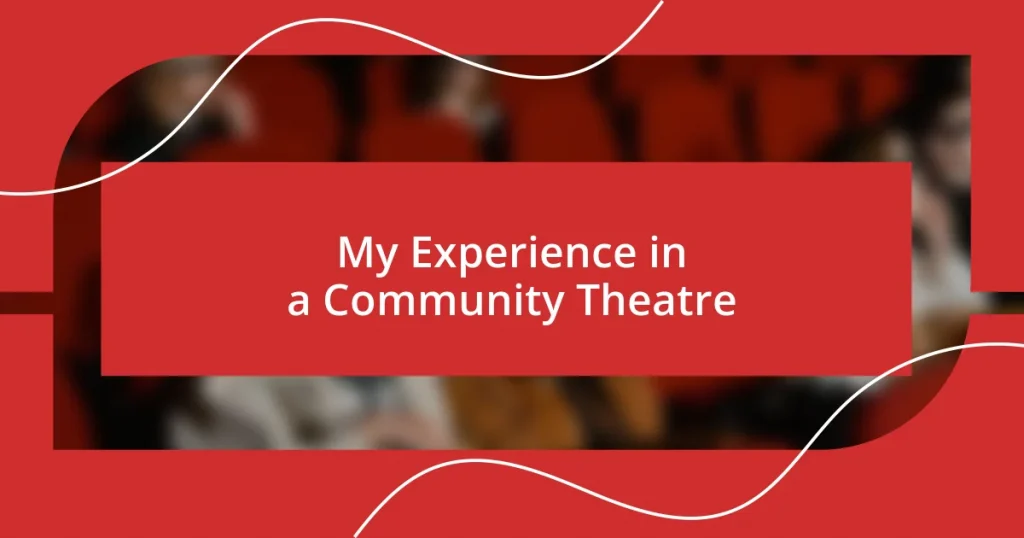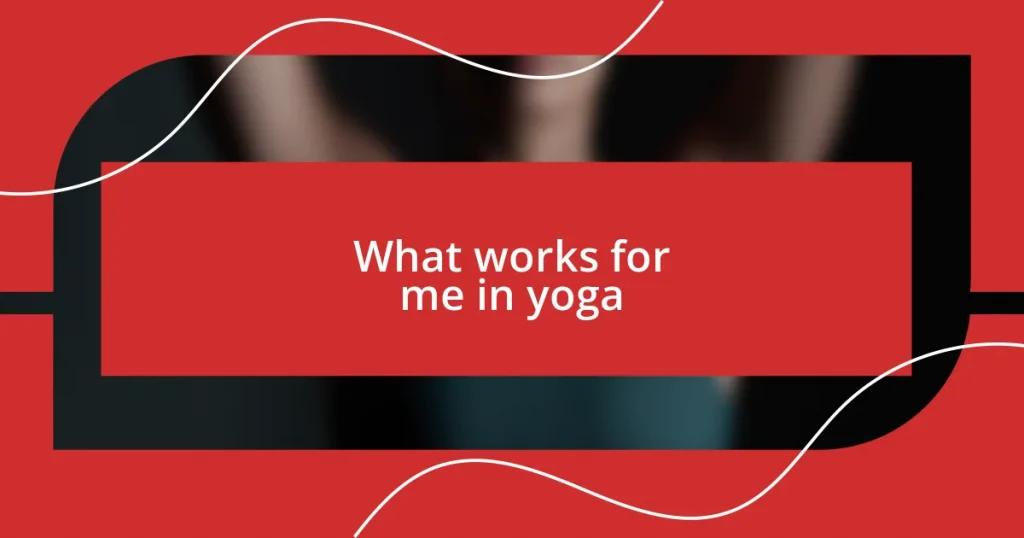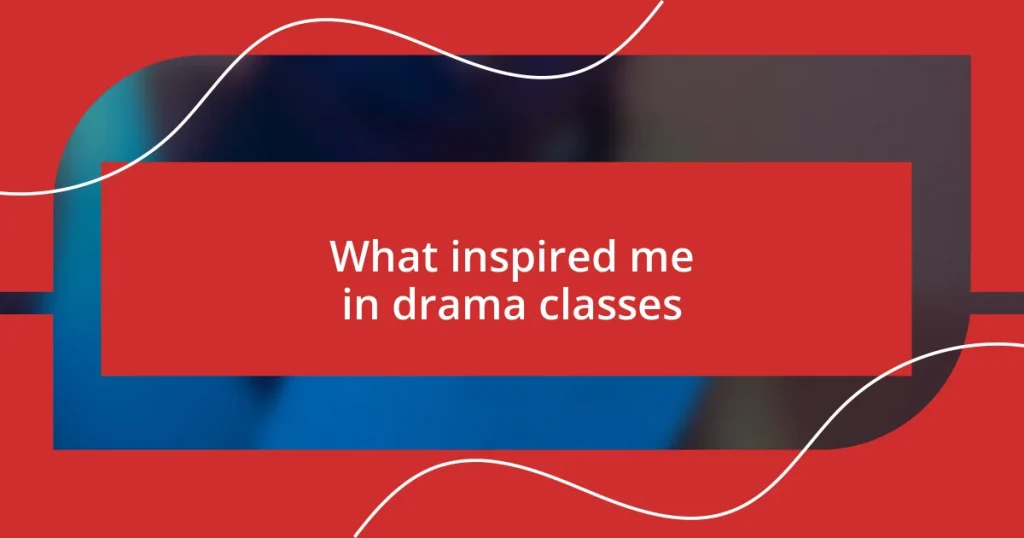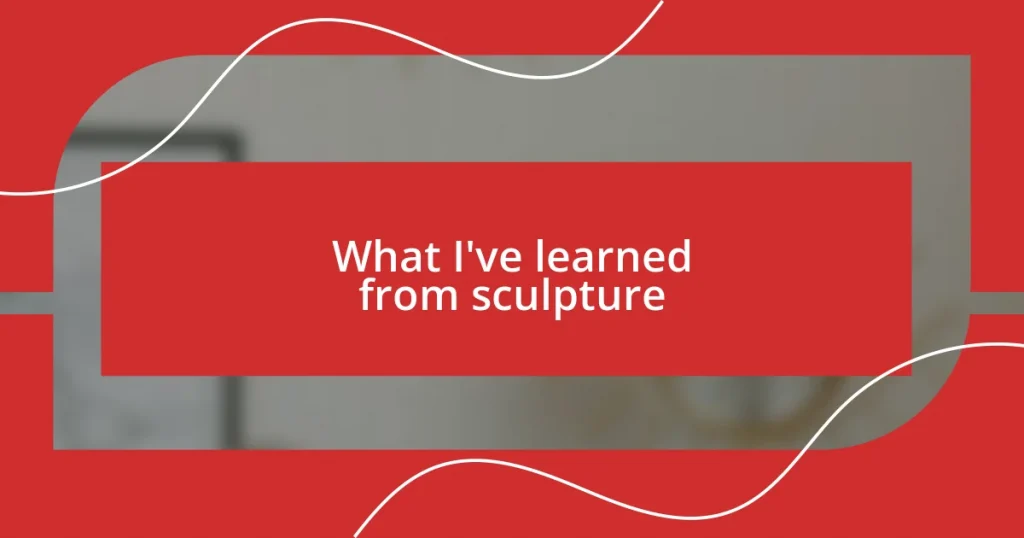Key takeaways:
- Community theatre fosters deep connections through shared experiences, laughter, and mutual support during rehearsals and performances.
- Auditioning and rehearsal processes teach valuable lessons in resilience, adaptability, and the benefits of vulnerability among cast members.
- Challenges such as technical glitches and balancing personal commitments highlight the importance of collaboration, self-care, and reliance on one another’s strengths.
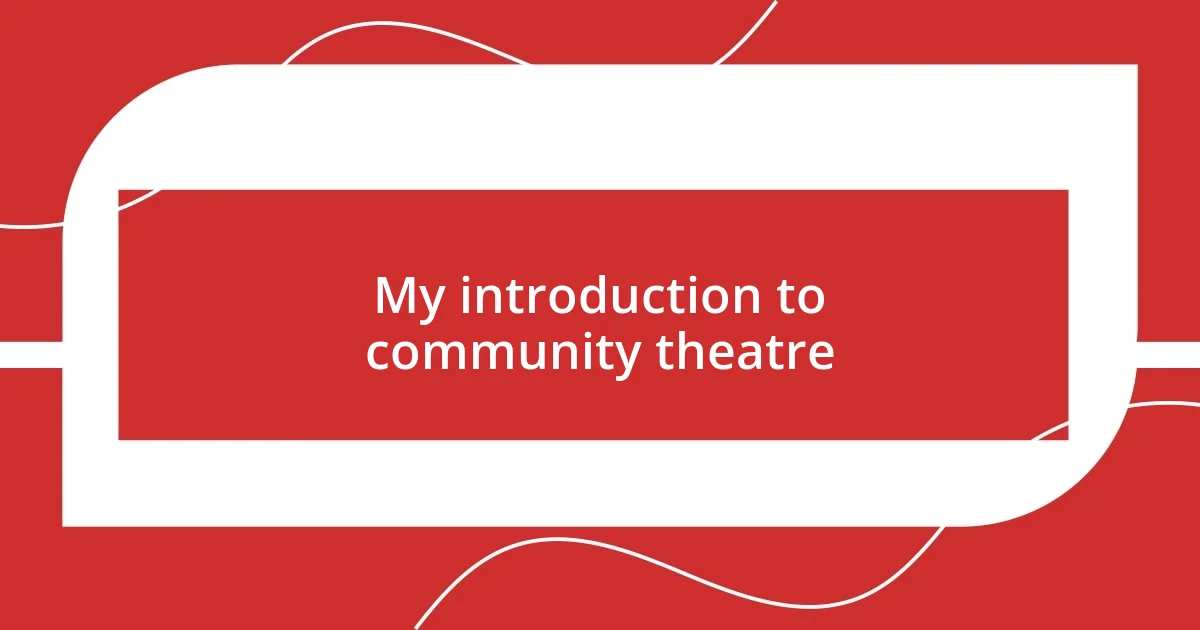
My introduction to community theatre
I still remember the first time I stepped into the community theatre. The air was thick with the scent of fresh paint and just a hint of the nervous energy that comes with rehearsals. Seeing everyone bustling around, practicing lines and adjusting costumes, filled me with a mix of excitement and trepidation. Have you ever felt like you were about to dive into something extraordinary, yet intimidating?
As I began to participate, I discovered that community theatre was more than just acting or performing. Each rehearsal became a tapestry of shared stories and laughter, forging friendships that felt like family. I recall one evening when we had a particularly tough run-through; despite the frustrations, we all rallied together afterward, sharing pizza and stories, realizing that our collective spirit made the struggle worthwhile. Wasn’t it fascinating how art can bring people from all walks of life together, united by a shared passion?
The moment I stepped on stage for my first performance, adrenaline coursed through my veins. I was terrified and exhilarated all at once. The supportive cheers from the audience made me feel like I was part of something much bigger than myself. It wasn’t just about putting on a show; it was about connecting with others and expressing emotions that often go unspoken. Have you ever experienced that magic of vulnerability in front of a crowd? It was in that moment that I truly understood the heart of community theatre.
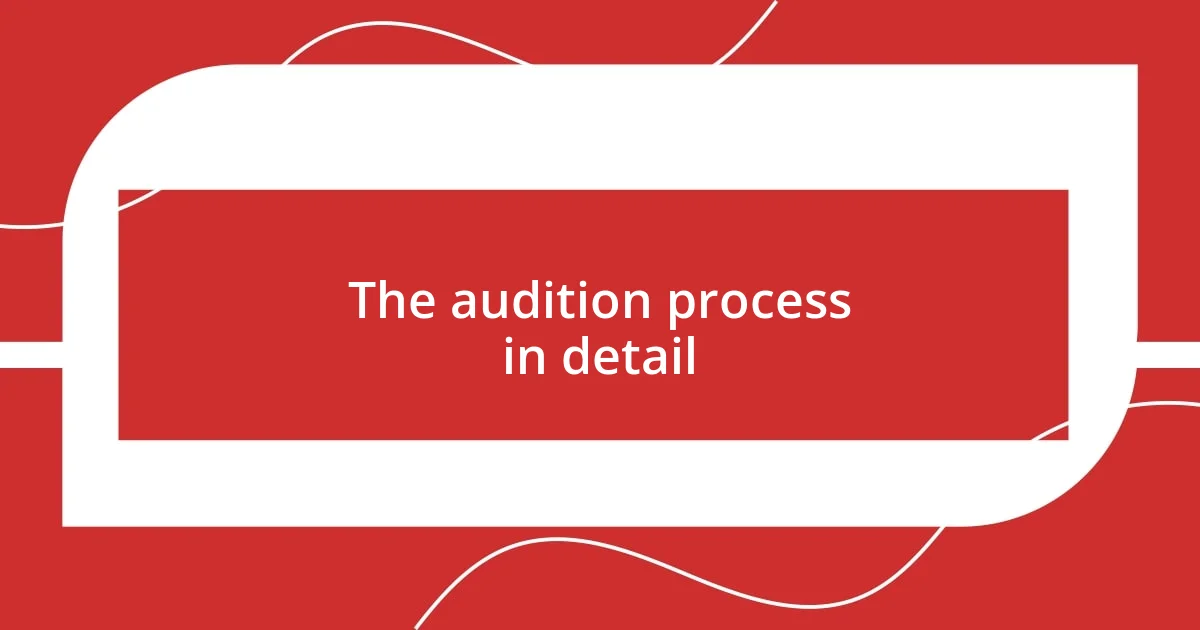
The audition process in detail
The audition process can feel like a whirlwind of emotions. I recall my first audition vividly—my heart raced as I entered the space, filled with hopeful faces, each carrying their own mix of ambition and anxiety. It was a nerve-wracking experience, but somehow, the excitement of showcasing my talent overshadowed the fear. Imagine standing there, facing a panel of directors, your mind swirling with lines and melodies, yet knowing this was your moment to shine.
Here’s a quick overview of what the audition process typically involves:
- Preparation: I learned the importance of choosing the right material. Selecting a piece that resonates with you can make the difference.
- Warm-ups: It’s crucial to shake off the nerves with vocal and physical warm-ups. I often found these moments helped ease my anxiety.
- The Audition: Entering that audition room is surreal. You present your prepared piece while being assessed not just on your performance but also on your presence and energy.
- Feedback: After the audition, receiving constructive criticism can feel daunting. However, I appreciated that it was a chance for growth rather than just a verdict on my skills.
- Callbacks: Making it to the callback stage is exhilarating. It means they saw something in you worth exploring further. I remember feeling a wave of relief and anticipation.
Through the entire process, I gained valuable insights into my abilities and the importance of resilience. While it was intimidating, I found that each audition brought me closer to my passion, helping me grow as both an artist and an individual.
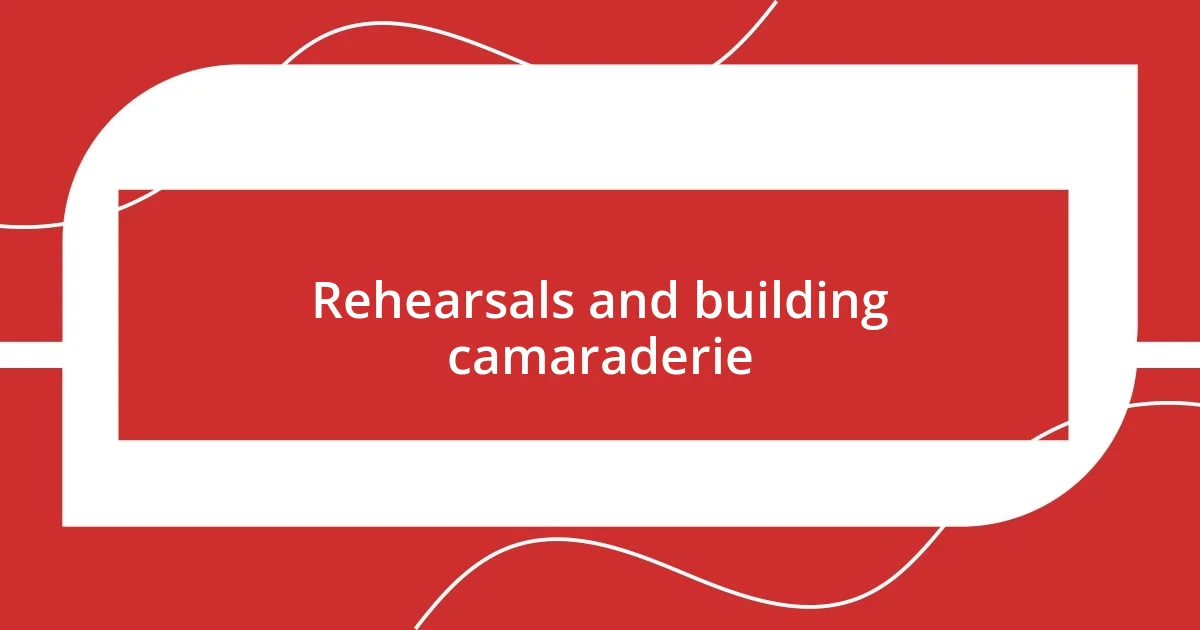
Rehearsals and building camaraderie
Rehearsals often transformed into more than just a practice for our upcoming performances; they were a ritual of connection. I remember one night, when we had difficulty nailing a scene, leaving everyone a bit disheartened. But after we took a moment to step back, the laughter and shared failures turned the atmosphere into one of warmth. It was in those moments that I felt our bond strengthen—each giggle, each shared pizza slice, further cemented the camaraderie we were building as a team.
The joy of rehearsals often came from those little unplanned moments. During one session, one of our actors accidentally tripped over a prop, leading to a chain reaction of laughter. Instead of feeling frustrated, we collectively embraced the humor of the situation; it reminded me of the importance of adaptability. Have you ever found comfort in the unpredictability of teamwork? Those delightful slips not only broke the tension but also made us appreciate each other’s presence and support during challenging scenes.
As I became more immersed in this world, I recognized that our rehearsals were the bedrock of trust. When we were vulnerable with each other—sharing our fears about performances or our struggles with the material—we grew closer. I distinctly remember another occasion when one of our newer members hesitated to share their ideas. After encouraging them, they eventually opened up, leading to a creative exchange that ultimately shaped our show. These interactions not only fostered my personal growth but also reinforced the idea that every person brings something unique to the table, enriching our collective effort.
| Moments during Rehearsals | Emotional Insights |
|---|---|
| Shared laughter over mistakes | Camaraderie through humor and support |
| Encouraging a shy actor to share | Fostering trust and collaboration |
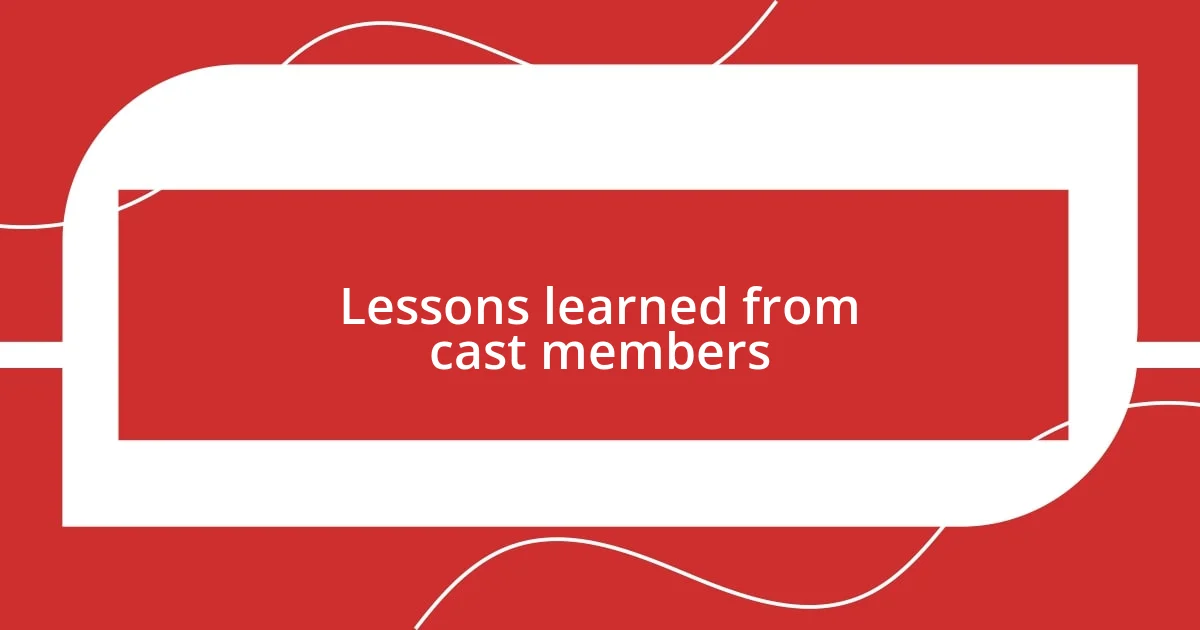
Lessons learned from cast members
Each cast member I interacted with brought unique perspectives that shaped my understanding of collaboration. I remember a moment during a group discussion when someone shared their experience of facing self-doubt. It sparked a heart-to-heart conversation about vulnerability in performance. Isn’t it fascinating how sharing our insecurities can help us bond? This experience reinforced the idea that sharing our struggles can create a supportive environment, making teamwork feel less isolating.
Another significant lesson I learned came from observing my fellow actors’ dedication. One evening, I watched as a cast member tirelessly practiced their lines long after our rehearsal ended. Their relentless pursuit of excellence inspired me to dig deeper into my own craft. It made me think: What does commitment look like for you? This reminder of the power of persistence pushed me to invest more in my practice, inspiring me and others to elevate our performances together.
In moments of improvisation, I found a true sense of trust in one another. During one rehearsal, an unexpected curveball forced us to adapt on the fly, and the creative solutions we crafted together were thrilling. It struck me that in these unscripted scenarios, we were not just individuals but a collective force. How often do we allow ourselves to be vulnerable, to innovate within our challenges? This spontaneity not only brought our characters to life but also solidified our connections, reminding me that every hiccup can lead to unexpected joys and breakthroughs.
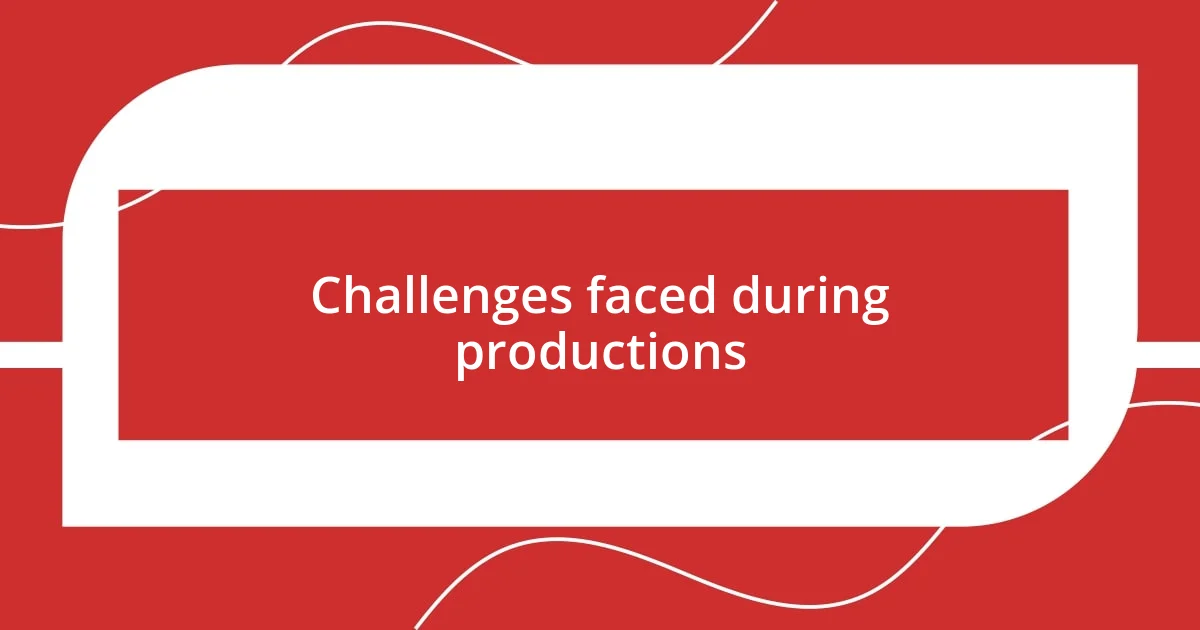
Challenges faced during productions
The pressure to deliver a great show often looms large over community theatre productions. I clearly remember one performance where a last-minute illness left us scrambling to find a replacement. It was stressful, and honestly, I felt a knot in my stomach wondering if we could pull it off. In those moments, I found out how crucial it is to rely on each other’s strengths; collaboration became our saving grace.
Technical glitches are another challenge that frequently popped up. During one show, the lights went out right in the middle of a pivotal scene! As the audience gasped, we had to improvise and keep the energy alive without our usual cues. Have you ever had to think on your feet in a challenging situation? I realized that our ability to adapt transformed potential disasters into shared stories, reflecting resilience and quick thinking under pressure.
Lastly, balancing our lives while committing to a production can stretch us thin. For instance, I struggled to juggle full-time work with evening rehearsals. There were moments when the exhaustion weighed me down, making it difficult to stay engaged. Yet, when I leaned on my fellow cast members for support, we all began to understand the importance of self-care during the creative process. It made me wonder: how can we better support each other in maritime balance? We started sharing tips on wellness, ultimately becoming a team that cared not just about the stage but also about one another’s well-being.










